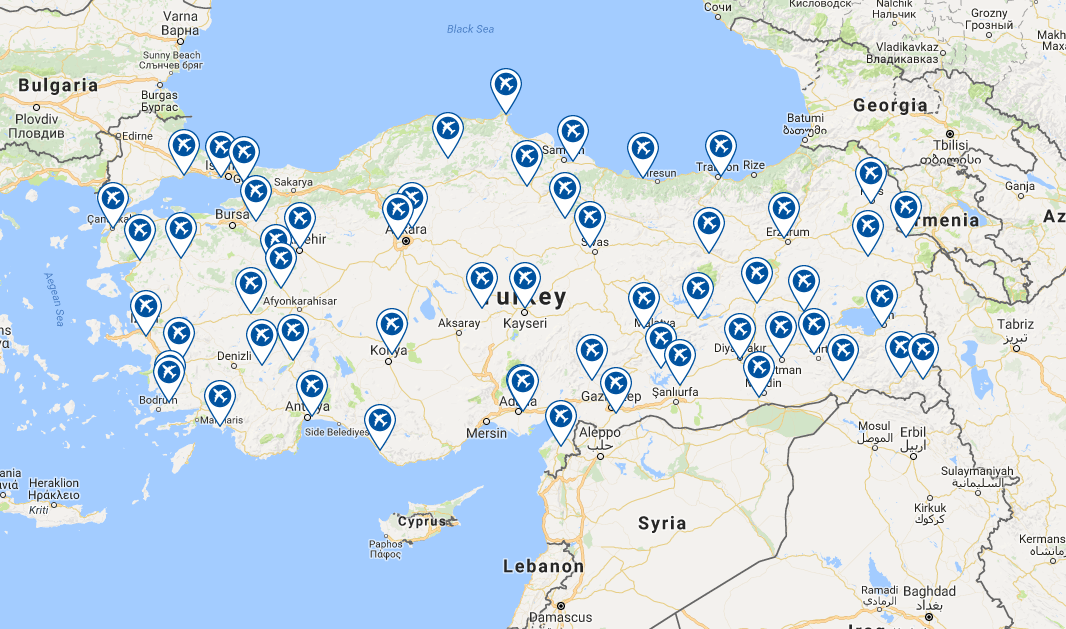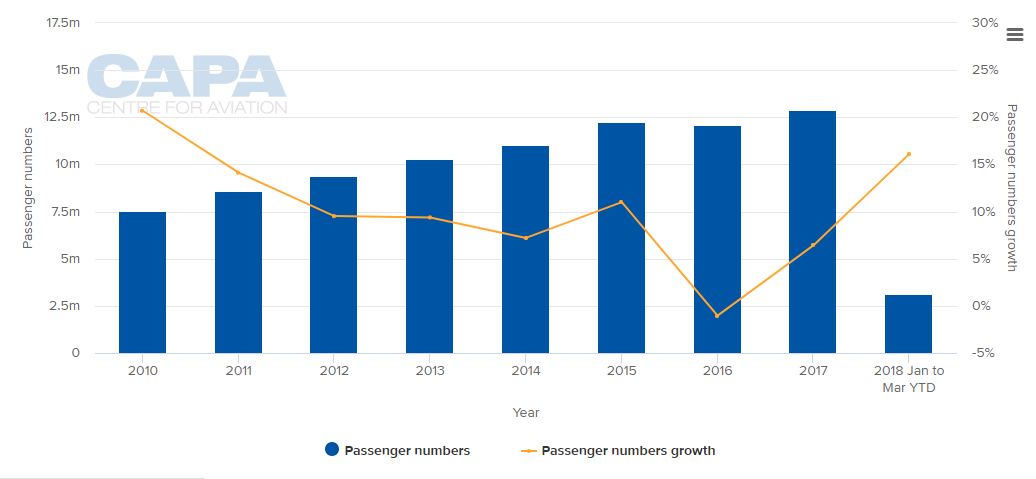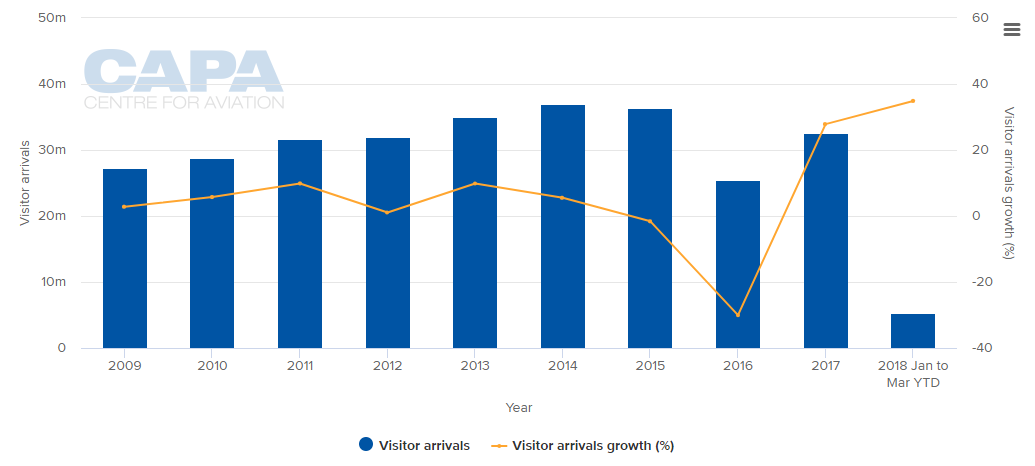Summary:
- Turkey continues to seek its "every citizen with 100 km of an airport" policy; currently this stands at 90%, according to its Minister of Transport, Maritime Affairs and Communications, Ahmet Arslan;
- Several new airports were put out to tender in 2017 and will open in 2020, with the largest project costing close to USD500 million;
- Separately, TAV is increasing its influence at Antalya Airport as the closure of Istanbul's Atatürk Airport looms;
- These airport projects will support an inbound tourist industry that is rallying since its 2016 collapse; 2017 arrivals were up 27.8% and grew at a 34.9% rate in Q1 2018.
A quick look at a list of Turkish airports and it appears that the country has more than enough. The 55, compares with just 35 scheduled service airports in Germany and is comparable with the United Kingdom which has 53, including 26 in Scotland and its many islands.
But it is often forgotten, especially in the west, just how physically large Turkey is. The total area of the country is in excess of 783,000 sq km, for a population of 80.8 million. Germany has a very similarly-sized population but it is contained within a land area of just 357,000 sq km, while the United Kingdom totals only 243,000 sq km.
MAP - Bridging Asia and Europe, Turkey is in a prime position - both geographically and economically - to take advantage of its growing aviation sector to further fuel economic growth from tourism and related industries. And it has an airport framework that can certainly help support that to happen Source: CAPA- Centre for Aviation and Google Maps
Source: CAPA- Centre for Aviation and Google Maps
And there is more to come for Turkey, Mr Arslan identified the following new airport/airport renewal projects as "ongoing": Bayburt Gümüşhane Airport; Rize Artvin Airport; Karaman Airport; New Izmir/ Çeşme Alaçatı Airport; West Antalya Airport; Çukurova Airport; Tokat Airport and Yozgat Hattuşaş Hattusas Airport.
Financial proposals are being received for Tokat Airport, while tenders will be invited for Karaman Airport later in 2018. The tender for the New Izmir/ Çeşme Alaçatı Airport will follow a build-operate-transfer model and was issued on 20-Apr-2018, while feasibility studies are still ongoing for West Antalya Airport. Çukurova Airport started to receive bids in late Mar-2018. In some cases, such as Tokat, there are already working airports in place.
Where investment amounts are known (by way of the CAPA Airport Construction Database), the largest project is Çukurova Airport, one which will serve the Turkish provinces of Mersin and Adana. The construction of the airport, which will have domestic and international terminals, is expected to take approximately 24 months and 4,500 construction workers were hired. Building commenced on 26-Mar-2017, and it is expected to open in 2019, around a year late. The total cost is put at USD458 million.
The Rize Artvin Airport project is another major one, with an estimated cost of USD257 million and will serve the coastal city of Rize. Modelled after the Ordu-Giresun Airport, the new airport is being constructed on reclaimed land off the coast of Rize. In Mar-2018 Transport Minister Arslan noted that construction was approximately 11% complete and final completion is scheduled for around Oct-2020.
Bayburt Gümüşhane Airport is a proposed airport that will serve the city of that name, in Bayburt Province. This is another project scheduled for completion by 2020. The price tag here is USD74 million and it has attracted the attention of President Recep Tayyip Erdogan, who commented on its pending construction in Nov-2017 when he said tender preparations were "ongoing".
2020 appears to be a sort of annus aeromirabilis in Turkey as Karaman Airport is also expected to open in that year, serving the city of the same name.
The New Izmir/Çeşme Alaçatı Airport is a proposed development to serve the province of Izmir, which already has a major airport, Izmir Adnan Menderes International Airport, owned and operated by TAV Holdings and which handled 12.8 million passengers in 2017. Çeşme Alaçatı is around 75km due east of the city of Izmir and its airport.
CHART - Izmir Adnan Menderes Airport is Turkey's fifth largest and has seen strong growth this decade with passenger levels rising from under 7.5 million in 2010 to 12.8 million in 2017 Source: CAPA - Centre for Aviation and TAV Airports Holding
Source: CAPA - Centre for Aviation and TAV Airports Holding
Yozgat Hattuşaş Airport is a proposed airport to serve the city of Yozgat and the construction tender was launched in mid-2017.
These are no outright private sector developments in most cases, they are either public sector ones under the auspices of the General Directorate of State Airports Authority (DHMI) , built by the private sector, or BOT projects such as the New Izmir airport.
Outside of these projects, trading continues in existing airports. For example, TAV Airports, which will lose its flagship Atatürk Airport in Istanbul when the new airport there opens, confirmed in Mar-2018 that a EUR300 million loan has been secured, intending it to be used to acquire a stake in Antalya Airport, with a further EUR60 million of company financing to be used for TAV's stake at Antalya to grow to 49%.
Apart from catering to Turkey's indigenous population and its desire to be easily able to access an airport, these developments will inevitably help support a foreign tourist business that is rallying after the terror-related events and attempted political coup d'état of 2016.
CHART - After dropping by just over -30% in 2016, visitor arrivals into Turkey has quickly recovered with a solid +27.8% growth in 2017 and it is growing by more than a third in 2018, up +34.9% across Q1 2018 Source: CAPA - Centre for Aviation and Turkey Ministry of Culture and Tourism
Source: CAPA - Centre for Aviation and Turkey Ministry of Culture and Tourism